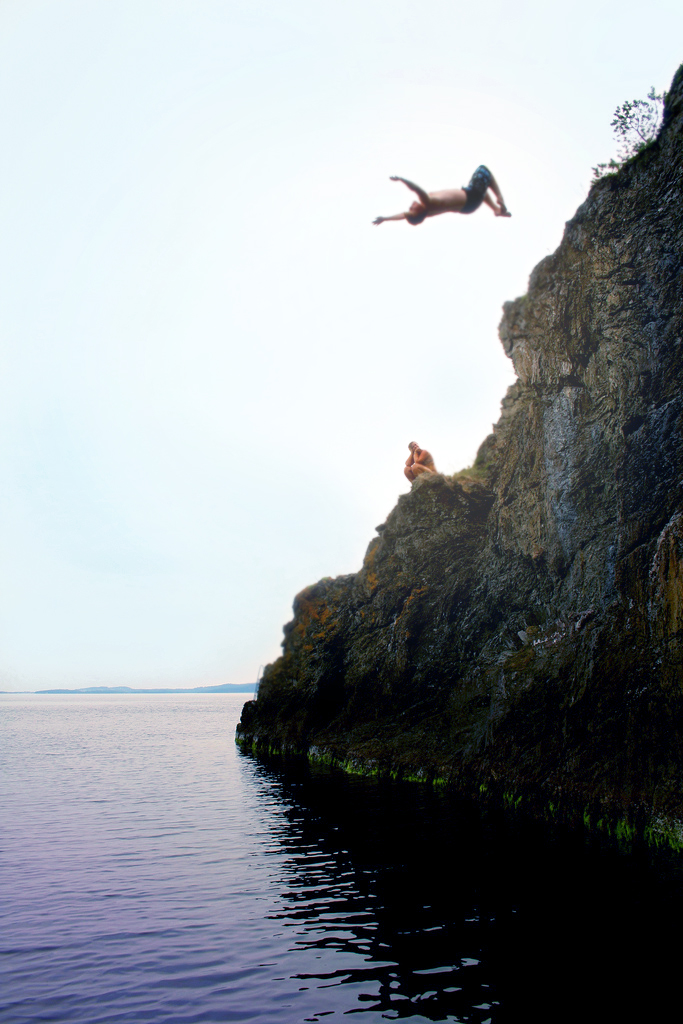For most people, making life-shaping choices begins with college and continues for the rest of their lives. Should you go to a small liberal arts college nearby or a big school across the country? What should your major be? Should you continue at a steady but uninspiring job or start your own company? Should you go to grad school, which should help you get more opportunities–but also incurs student loans?
In making these choices, it’s easy to be swayed by our ethos of risk-loving. We are continually told to “step outside of our comfort zone,” “take a risk,” try new thrills from skydiving to ziplining to new diets, new destinations, new lovers. In his inaugural address of 2009, President Obama praised “the risk-takers, the doers, the makers of things.” We are rarely, if ever, told to be prudent, cautious, or steadfast–these are qualities associated with “risk aversion,” which basically amounts to lack of vision, guts, and zest.
Thus it’s not surprising that in Western culture, risk-takers are better rewarded than the risk-averse (which of course contributed to the financial crisis of 2008). Not surprisingly, a recent study found that riskier people are more likely to become entrepreneurs–but more surprisingly, it also found that risk-lovers are also less likely to succeed in their ventures. The researchers at the University of Bergen in Norway and the University of Stirling in the UK analyzed the investment data for 400,000 Norwegians and found that those who chose to invest in stocks, rather than less risky bonds or savings accounts, were 50% more likely to become entrepreneurs. But these start ups founded by risk-lovers also performed lower than those founded by the risk-averse, with 25% lower sales and 15% lower return on assets.
This finding shows our misunderstanding of risk-taking in its true sense. Merriam-Webster Dictionary defines “risk” as “the possibility of loss or injury.” So it follows that weighing the costs and benefits carefully will be greatly beneficial in both professional and personal life. This is a far more valuable and mature quality than “risk-loving,” which we often confuse for nobler traits like courage–but which really is closer to “attraction to high-risk propositions.” Often, the high-risk choices are also high-reward; but other times, they might offer the same or even lower reward than the less risky choice. So risk-taking on its own isn’t the ingredient for success.
What then helps us make tough decisions that lead to extraordinary outcomes? It is the tolerance of the unknown. It is courage against the fear of not knowing, the resilience to disappointing outcomes, and calm optimism when plans must change. Tolerance of the unknown is the quality that comes into play after making a decision, not before. Unlike risk-loving, it’s not an inclination, tendency, natural disposition–instead, it’s a muscle built by spiritual, mental, and emotional practice, just like courage.
When you are facing difficult choices, don’t feel pressured by the siren call of risk-taking. Here is how to weigh your options and make the best decision for you.
1. Think about the costs and benefits of each choice: Make a list of pros and cons for each choice. Notice the different rewards and risks, and deal breakers, if any. Feel free to seek advice from trusted friends, family, and mentors, but remember that you have to do what speaks to your heart and mind.
2. Once you make the choice, make sure you own it: Whether it’s starting a new job (or quitting a less-than-fulfilling one), moving, or changing your field, once you decide to take the chance, commit to it fully. Invest your energies in moving forward, not looking back or worrying about whether you made the right choice.
3. Deal with the unknown: This is the part that truly challenges us as humans, not before you make a choice–so embrace the new feelings and experiences. Notice how you feel without judgment, whether it’s uncertainty, anxiety, hope, optimism, excitement, or stress. Then locate the source of any negative emotions and work through their causes. Often you will find that those triggers are not warranted, and you will be able to let go.
4. Increase your tolerance of the unknown: If you get stressed out when your plans go awry, or feel the need to control every aspect of your life, it might be helpful to become more resilient to the unknown.
Try becoming more flexible with your daily routine. Start small: for instance, try a new running route, or meet up with an old friend you’ve not seen in years. Build up your tolerance with real challenges, and acknowledge how you feel when you’re outside of your comfort zone. Before you know it, you will be better equipped to make the right decisions in life–and succeed in following through with them.
Also in Career: 5 Ways to Reduce Anxiety and Stay Productive at Work
How to Make 2014 Your Career-Making Year
Going For It: Dream Jobs and Self-Confidence
__
Photo: Christoffer Sundby via Flickr





